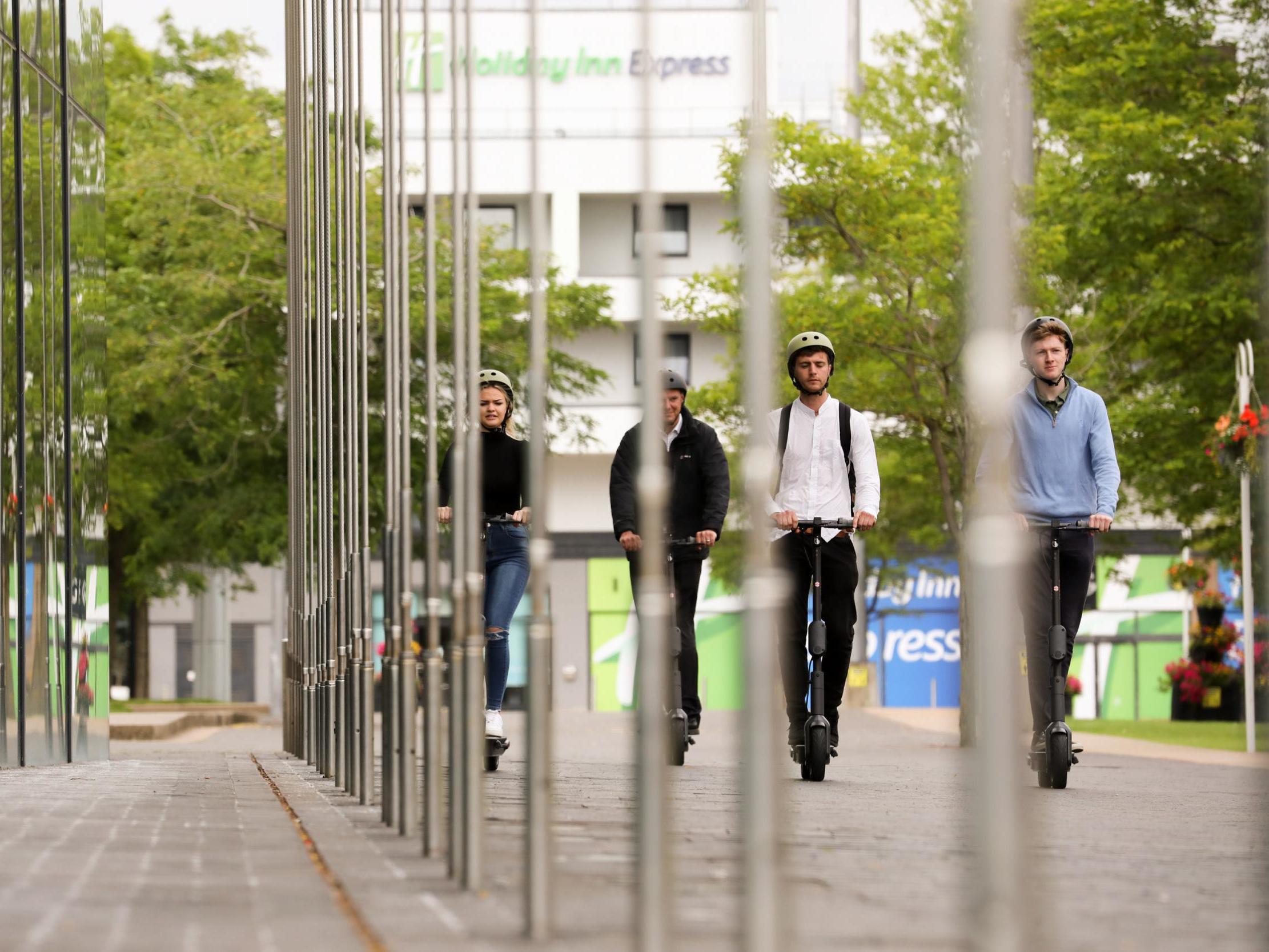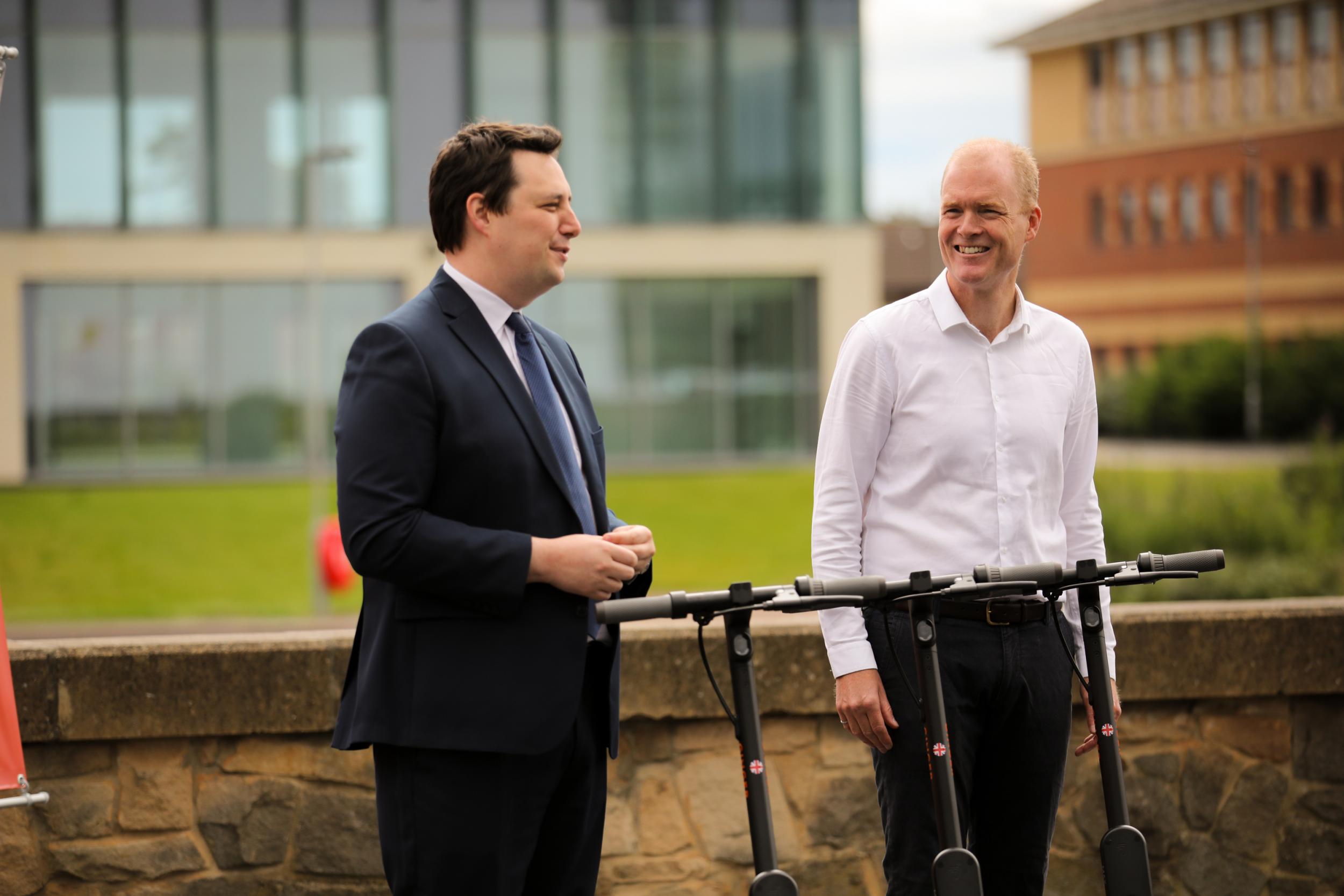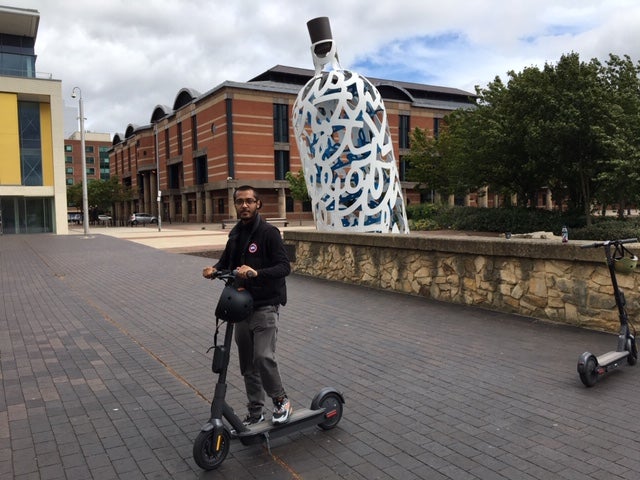Clean, green – and dangerous? First e-scooter trial launches in Middlesbrough, but opinion is divided
Enthusiasm and scepticism present in equal measure on Teesside

Your support helps us to tell the story
From reproductive rights to climate change to Big Tech, The Independent is on the ground when the story is developing. Whether it's investigating the financials of Elon Musk's pro-Trump PAC or producing our latest documentary, 'The A Word', which shines a light on the American women fighting for reproductive rights, we know how important it is to parse out the facts from the messaging.
At such a critical moment in US history, we need reporters on the ground. Your donation allows us to keep sending journalists to speak to both sides of the story.
The Independent is trusted by Americans across the entire political spectrum. And unlike many other quality news outlets, we choose not to lock Americans out of our reporting and analysis with paywalls. We believe quality journalism should be available to everyone, paid for by those who can afford it.
Your support makes all the difference.Monday morning and, in Middlesbrough’s Centre Square, the Tees Valley mayor – clad in suit, tie, shoes and crash helmet – is whizzing around, in front of a small crowd, on an electric scooter.
“I’ve been practising riding in the office car park,” Ben Houchen told The Independent afterwards. “Nightmare to fall off.”
Welcome to day one of what advocates hope will be the start of a transport revolution.
This is the first ever trial of pay-as-you-go e-scooters on UK roads – launched barely a week after the law was changed to make such vehicles legal on public highways.
A fleet of 100 are being distributed across Middlesbrough and nearby Hartlepool for anyone over the age of 18 to jump on, swipe an app and zip away.
In the age of coronavirus age, the thinking goes, they could ease pressure on public transport while helping ensure the economic recovery is not built solely on emission-spewing cars.
And, while the Tees Valley is the first place in Britain to pilot them, e-scooters are almost certainly coming to a town or city near you soon.
At least 50 local authorities are currently said to be in talks with different companies about launching similar schemes in their own areas. Portsmouth, Derby, Birmingham and Bristol are all hoping to launch trials later in the summer, while international scooter firms, such as Lime and Tier, are clamouring to be allowed into markets like London, Liverpool and Manchester.
If all goes well, bosses at Ginger – the British start-up behind the Middlesbrough trial – hope to have 10,000 of their black-and-orange models on British roads by next summer. Even rural locations could see an influx: council officials in Staffordshire are currently in talks with the firm about how they could be used to connect the county’s villages.
Advocates say, taken together, all this could transform the way we travel – much as they already done in cities like Copenhagen, Madrid and Brisbane. “We’ve wanted these here for a couple of years,” Mr Houchen said. “They’re not a panacea of public transport but they can be a fantastic, clean, cost-effective part of the offer. Socially distanced too.”
Yet there are also concerns.
The last time something comparable was tried in the UK – dockless bikes – it was an almost unmitigated failure. Within little more than a year of thousands of hire cycles appearing in cities across the country – including Manchester, Cambridge and Norwich – most had been withdrawn again.
Widely-reported issues included masses of discarded bikes cluttering up streets and blocking pavements, as well as widespread vandalism. Dozens were thrown in waterways. In Sheffield, one ended up a in a suburban tree.
The question is, can e-scooters really change the way we travel or are they, too, destined to arrive in their thousands before disappearing again?

That scooters represent a cleaner mode of transport than a car is unarguable. They are also huge fun to ride, with a top speed of 12mph, which is faster than it sounds.
“It’s such a good idea,” said Noor Uddin, a 23-year-old call centre worker who became one of the first riders after wandering through Centre Square on his lunch break. “Middlesbrough never gets anything like this. Brilliant.”
At £2 for 20 minutes, they are inexpensive to hire but not exactly cheap. Riders cannot take them on the pavement and are advised to wear a helmet. Would Mr Uddin use them regularly? “Definitely,” he says. “It’s a 15-minute walk from the bus station to work for me. Get on one of these and it’d take about two. Although I’d probably end up going a long way just for a bez around.”
This is the reaction Ginger was hoping for. Success of the 12-month trial, it says, will not just be judged on the number of journeys being made – although about five rides per day per scooter is initially envisioned – but by the kind of travel being undertaken. That is to say, it needs people like Mr Uddin commuting in order to make this a viable long-term proposition.
“To have sustainability and scalability, it is absolutely those journeys that are important,” says Paul Hodgins, the company’s chief executive and a one-time leader of Richmond Council in London. “It’s great if people want to ride them for leisure but they are here to help people move around, to get to the office or university. We want them to become an alternative to the car.”
The ultimate end result, he says, should be “reduced congestion and pollution”. The Campaign for Better Transport agrees. “Scooters can provide a flexible, easy-to-use and convenient way round,” says Darren Shirley, chief executive of the advocacy group. “We’re delighted this is being explored.”
They may, he adds, have a better uptake than hire cycles ever did. “I think standing on a scooter can appeal to people in shirts and suits doing that last mile to work in a way that bikes perhaps just don’t,” he says.
Crucially, the Tees Valley trial – which will ultimately see 500 vehicles rolled out to Darlington, Stockton-on-Tees and Redcar – aims to pre-empt the issues of vandalism and clutter associated with dockless bikes. For one thing, the scooters are very heavy.
Secondly, while they are indeed dockless, they will have to be parked in one of a limited number of geo-fenced hubs, such as at the train station or down by the Riverside Stadium. Users that do not leave the vehicles at such a spot will continue to be charged £2 every 20 minutes indefinitely.

But not everyone is convinced this will deter vandalism or thieves. “I’d be astonished,” shrugs a worker at the city’s Cycle Centre lock up, “if they didn’t end up being stolen or broken. People can be creative”.
While some cities have seen the concept thrive since it became widespread in 2018 – schemes in Lisbon and Vienna are notably popular – roll-outs elsewhere have been beset by problems.
When the American companies Lime and Bird launched in Oakland in California, more than 100 scooters ended up in Lake Merritt within the first three months. In San Francisco some 200 vehicles from an initial fleet of 650 were reported either stolen or damaged beyond repair in the first fortnight. Copenhagen is said to have issues with drink-riders. Paris – which has 20,000 of the vehicles – appears to be in a constant state of crackdown against speeders and inconsiderate parkers.
Questions about safety also persist. The National Federation of the Blind UK is so concerned it is already calling for trials to end. Its members, they say, are the pedestrians most likely to be mown down by the speedy, silent vehicles.
“They are inherently dangerous and they have been legalised in a rush without any proper scrutiny or oversight,” says Sarah Gayton, the charity’s shared space coordinator. “Make no mistake, we will see blind and partially sighted people hurt as a result of this. That is what has happened in every country this menace has been introduced and it will happen here.”
Even how green these machines truly are is open to question. For now there are no central charging points for their batteries. Each time a scooter runs out of juice, after about an hour’s travel, it must be picked up by van and driven to Teesside International Airport for rebooting.
Mike Hill, the MP for Hartlepool, hopes the scheme will work but remains sceptical. “I hope I’m proven wrong,” he said. “But I don’t envisage people here zipping to work down the A19 on scooters. The only journeys these will replace are journeys which people would otherwise walk.” This region, he added, could be at the centre of a green industrial and transport revolution. “But are scooters left around town centres part of that? I’m not convinced.”
Back in Middlesbrough these concerns, acknowledged by both Ginger and the mayor, have not yet dampened the enthusiasm. The point of the trials, they said, was to iron out such issues as they emerge. If they are successful here on Teesside, they can be successful across the UK, Mr Houchen said.
He said he believed the bigger cities that usually got such trials, like London, Manchester and Leeds, were not necessarily representative of much of the rest of the country. If scooters are to be transformative beyond those urban centres, it needs to be tested beyond them, he said.
Will Mr Houchen make use of the scooters himself, then? “Any excuse to get on one,” he laughs – although when he left Wednesday’s launch, he did so, it may be worth saying, by car.
Join our commenting forum
Join thought-provoking conversations, follow other Independent readers and see their replies
Comments